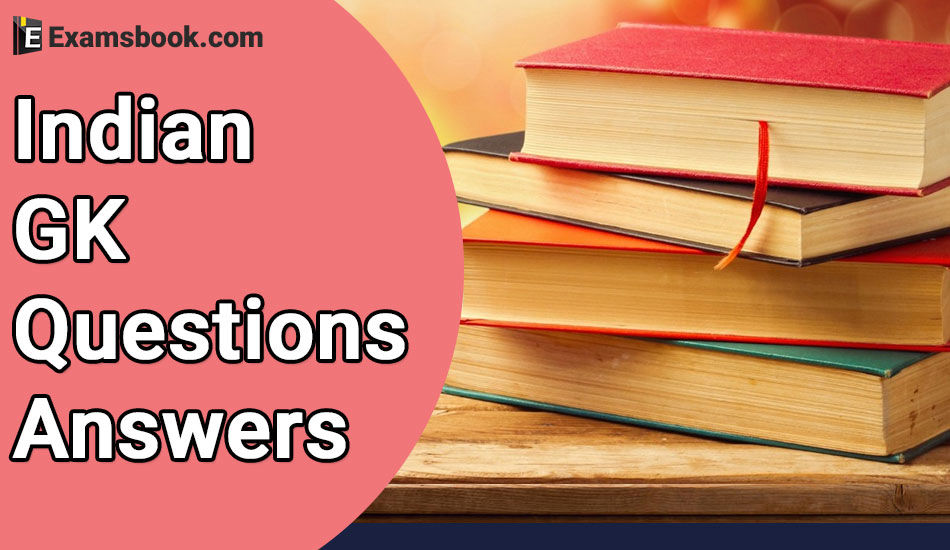Indian GK Questions and Answers in English for Competitive Exam

Which freedom is considered the ‘Hallmark of Democracy’?
(A) Right against exploitation
(B) Right to freedom of religion
(C) Freedom of assembly
(D) Freedom of speech and expression
Correct Answer : D
Explanation :
RIGHT TO FREEDOM OF RELIGION
According to our Constitution, everyone enjoys the right to follow the religion of his or her choice. This freedom is considered as a hallmark of democracy.
On which day the Constituent Assembly finally met for the last time?
(A) 26 November, 1949
(B) December 5, 1949
(C) January 24, 1950
(D) 25 January, 1950
Correct Answer : C
Explanation :
The correct answer is 24 January 1950. The Constituent Assembly met for the first time in New Delhi on 9 December 1946, and its last session was held on 24 January 1950.
What is the number of Lok Sabha seats in Maharashtra?
(A) 42
(B) 34
(C) 48
(D) 48
Correct Answer : D
Explanation :
19 Rajya Sabha members and 48 Lok Sabha members are elected.
Who among the following first presented the idea of a Constituent Assembly for the creation of a Constituent Assembly for India?
(A) Swaraj Party 1924
(B) Congress Party 1936
(C) Muslim League in 1942
(D) All Party Conference 1946
Correct Answer : A
Explanation :
The idea of a constituent assembly was first proposed in 1934 by M.N. Roy. However, the actual constituent assembly was formed in 1946 on the basis of the cabinet mission plan.
Who presented the Objective Resolution in the Constituent Assembly?
(A) Satchidanand Sinha
(B) Jawaharlal Nehru
(C) Dr. B. R. Ambedkar
(D) Acharya J. B. kriplani
Correct Answer : B
Explanation :
Pt. Jawaharlal Nehru introduced the 'Objective Resolution' in the Constituent Assembly on December 13, 1946. This resolution as accepted by the Constituent Assembly, forms the basis of the Indian political system. It guided the Constitution-making process.
In which part of the constitution the process of amendment of the constitution is mentioned?
(A) Part 3
(B) Section 4
(C) Part 20
(D) Part 21
Correct Answer : C
Explanation :
The procedure of amendment in the constitution is laid down in Part XX (Article 368) of the Constitution of India. This procedure ensures the sanctity of the Constitution of India and keeps a check on the arbitrary power of the Parliament of India.
Who is considered the creator of the Constitution of India?
(A) Mahatma Gandhi
(B) B.R. Ambedkar
(C) Jawaharlal Nehru
(D) BN Rao
Correct Answer : B
Explanation :
Dr BR Ambedkar, the chairman of its Drafting Committee, is considered the chief architect of the Indian Constitution which provides a comprehensive and dynamic framework to guide and govern the country, keeping in view her unique social, cultural and religious diversity.
The effect of which revolution is not visible on the Preamble of the Indian Constitution?
(A) French Revolution (1789)
(B) American Revolution (1776)
(C) Bolshevik Revolution (1917)
(D) Revolution of China (1912)
Correct Answer : D
Explanation :
China revolution of 1912- In 1912, the Qing (or Manchu) dynasty was overthrown by a nationalist democratic revolt that created a republic. It was losing its last capable leader. The emperor Puyi was a child in 1911, and the regency was incompetent to guide the country. When an agreement was signed (April 5, 1911) with a four-power group of foreign bankers for the construction of lines on the Hukwang (Huguang) Railway in central China, the chain of events that immediately led to the revolution began.
From which day the Constituent Assembly emerged as a provisional parliament?
(A) 24 January, 1950
(B) 25 January, 1950
(C) January 26, 1950
(D) 18 February, 1950
Correct Answer : C
Explanation :
On 26 January 1950, the constitution took effect (commemorated as Republic Day), and the Constituent Assembly became the Provisional Parliament of India (continuing until after the first elections under the new constitution in 1952).
Who among the following was not a member of the Constitution Manuscript Committee?
(A) Mohammad Sadullah
(B) K.M. Accountant
(C) A.K. Iyer
(D) Jawaharlal Nehru
Correct Answer : D
Explanation :
Among the options, only Dr Rajendra Prasad is NOT a member of the Drafting Committee. Dr Rajendra Prasad was the permanent president of the constituent assembly.



